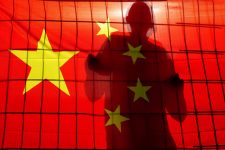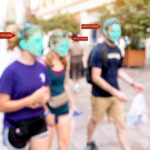China to Rate Citizens and Regulate All Aspects of Their Lives

The Chinese Communist Party (CCP) is aiming to roll out its social credit system nationally by 2020. This is a mass surveillance system that relies on big data analysis the scope of which is so vast and invasive that it would make George Orwell shudder.
Social credit is a system that will see each of China’s 1.4 billion citizens given a personal scorecard, which will allow them to be awarded points for meritorious behaviour, while points will be docked for conduct that’s deemed bad.
In its broadest vision, China’s network of over 200 million CCTV cameras will be equipped with facial recognition, geo-tracking and body scanning technologies, which will track all citizens’ movements. And smartphone apps will monitor their behaviour online, as well as collect data about them.
This system, which will see people’s social credit scores being updated in real time, was officially announced in a 2014 State Council Notice. It outlined that in China “trust-keeping is insufficiently rewarded,” while “the costs of breaking trust tend to be low.”
But, this will all change under Chinese president Xi Jinping’s vision that will allow the “trustworthy to roam everywhere under heaven, while making it hard for the discredited to take a single step.”
Indeed, this social engineering scheme on a gargantuan scale will see those with a high social credit rating climb the social ladder, and those whose credit dwindles will be barred from certain everyday aspects of life.
The nightmare is upon us
Three dozen pilot social credit systems are already operating throughout China. At present, it’s unclear whether the national system will see various government-run and private systems operating together or if one unified system will be implemented.
Behaviours that can send an individual’s social credit into decline include traffic violations, smoking in designated non-smoking areas, cheating on video games, buying large quantities of alcohol and paying bills late.
A low social credit rating can see restrictions being placed on an individual’s travel and accommodation options, their barring from certain employment opportunities, access to the best schools can be blocked for their children and acquiring a housing loan can become problematic.
But, doors open for those with a high credit rating. Citizens whose behaviour has been monitored favourably can access cheap loans, receive special treatment at hotels and airports, access to health services can be expedited, and the best employment and educational opportunities are theirs.
Social credit in operation
The city of Rongcheng in Shandong province already has a social credit system in operation, which many locals are unaware of. Each of the 740,000 residents were assigned 1,000 credit points and from there certain behaviours can lead those points to increase or disappear.
A traffic ticket will see 5 points deducted, whereas helping your family out in hard times, conducting good business practices or doing something beneficial for the community can see 30 points gained. Credit can also be earned for donating to charities or carrying out volunteer work.
And Chinese citizens are already being punished under existing social credit systems. In March this year, the National Development and Reform Commission announced that 9 million people had been barred from buying plane tickets and a further 3 million from purchasing business-class train tickets.
Independent journalist Liu Hu’s reporting on government corruption led his social credit to plummet. He’s now banned from travelling and is basically confined to his Chongqing apartment, while his social media accounts have been closed down.
Privatised social credit
Social credit schemes are also being run by private companies. The most well-known one is Sesame Credit, which was launched in 2015 by the Ant Finance Services Group, which is the financial arm of e-commerce giant Ali Baba.
Under this social credit scheme, customers receive a score of between 350 and 950 points based on online activity, such as social media interactions and purchasing practices. A high credit scoring can lead to preferential loans, as well as a trustworthy profile on related sites.
Sesame Credit is also being used by authorities to punish users. Chinese courts are passing on information to the private company about people who’ve failed to pay their court fines, and this is leading to a drop in the social credit rating of these individuals.
Cultural genocide
The CCP is currently utilising similar technologies in far more repressive ways in Xinjiang province, where a data surveillance system known as the Integrated Joint Operations Platform (IJOP) is being deployed and expanded.
The IJOP is being used to track, monitor and control the behaviour of the local predominately Muslim Uyghur population, using an integrated network of technologies, which includes facial recognition, infrared capabilities and online data collection.
According to Human Rights Watch, behaviour that this system flags as suspicious can include an individual suddenly buying more fertiliser than usual, a family storing large amounts of food in their home, or a person who owns a large amount of books.
And individual’s who’ve had their behaviour questioned are then sent to political re-education centres, where they’re held in indefinite detention, without charge or trial. Today, up to one million Uyghur people are being detained in these camps.
Whisperings in Australia
Most people in Australia believe that a scheme like the Chinese social credit system would never see the light of day in this country. And whilst the Turnbull/Morrison government hasn’t suggested such a system, it is proposing to roll out a national facial recognition scheme.
At a COAG meeting in October last year, it was agreed that the National Facial Biometric Matching Capability will be established. This is a system that will provide authorities with real time access to all citizens’ identification photos that can be matched with images from CCTV footage.
The legislation – which will allow for a centralised hub that links federal and state databases containing the images of all Australians – is currently under the review of the Parliamentary Joint Committee on Intelligence and Security.
Human rights lawyer Julian Burnside told Sydney Criminal Lawyers® back in June that this system would effectively turn every CCTV camera into a plain-clothes police officer capable of identifying all that pass.
“The fact that you are walking down Collins Street on Friday morning could be linked to all the information government has about you: Medicare information, ticket information, Centrelink information,” Mr Burnside warned.







